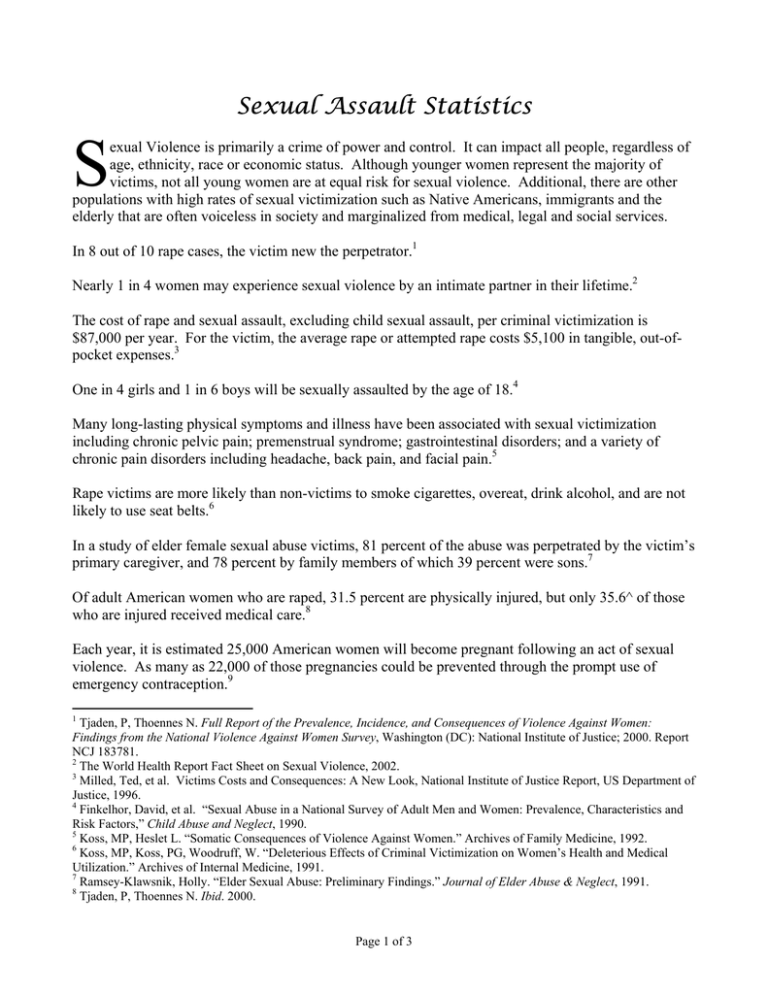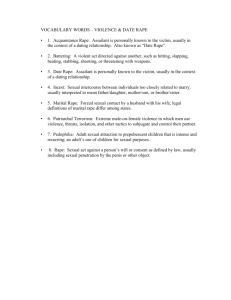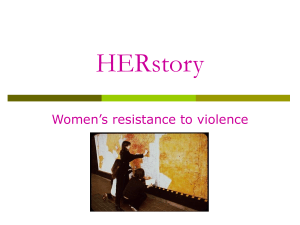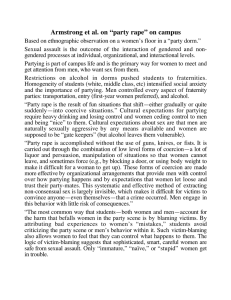
Sexual Assault Statistics
S
exual Violence is primarily a crime of power and control. It can impact all people, regardless of
age, ethnicity, race or economic status. Although younger women represent the majority of
victims, not all young women are at equal risk for sexual violence. Additional, there are other
populations with high rates of sexual victimization such as Native Americans, immigrants and the
elderly that are often voiceless in society and marginalized from medical, legal and social services.
In 8 out of 10 rape cases, the victim new the perpetrator.1
Nearly 1 in 4 women may experience sexual violence by an intimate partner in their lifetime.2
The cost of rape and sexual assault, excluding child sexual assault, per criminal victimization is
$87,000 per year. For the victim, the average rape or attempted rape costs $5,100 in tangible, out-ofpocket expenses.3
One in 4 girls and 1 in 6 boys will be sexually assaulted by the age of 18.4
Many long-lasting physical symptoms and illness have been associated with sexual victimization
including chronic pelvic pain; premenstrual syndrome; gastrointestinal disorders; and a variety of
chronic pain disorders including headache, back pain, and facial pain.5
Rape victims are more likely than non-victims to smoke cigarettes, overeat, drink alcohol, and are not
likely to use seat belts.6
In a study of elder female sexual abuse victims, 81 percent of the abuse was perpetrated by the victim’s
primary caregiver, and 78 percent by family members of which 39 percent were sons.7
Of adult American women who are raped, 31.5 percent are physically injured, but only 35.6^ of those
who are injured received medical care.8
Each year, it is estimated 25,000 American women will become pregnant following an act of sexual
violence. As many as 22,000 of those pregnancies could be prevented through the prompt use of
emergency contraception.9
1
Tjaden, P, Thoennes N. Full Report of the Prevalence, Incidence, and Consequences of Violence Against Women:
Findings from the National Violence Against Women Survey, Washington (DC): National Institute of Justice; 2000. Report
NCJ 183781.
2
The World Health Report Fact Sheet on Sexual Violence, 2002.
3
Milled, Ted, et al. Victims Costs and Consequences: A New Look, National Institute of Justice Report, US Department of
Justice, 1996.
4
Finkelhor, David, et al. “Sexual Abuse in a National Survey of Adult Men and Women: Prevalence, Characteristics and
Risk Factors,” Child Abuse and Neglect, 1990.
5
Koss, MP, Heslet L. “Somatic Consequences of Violence Against Women.” Archives of Family Medicine, 1992.
6
Koss, MP, Koss, PG, Woodruff, W. “Deleterious Effects of Criminal Victimization on Women’s Health and Medical
Utilization.” Archives of Internal Medicine, 1991.
7
Ramsey-Klawsnik, Holly. “Elder Sexual Abuse: Preliminary Findings.” Journal of Elder Abuse & Neglect, 1991.
8
Tjaden, P, Thoennes N. Ibid. 2000.
Page 1 of 3
There is at least a 50 percent likelihood that a woman will develop Post Traumatic Stress Disorder
(PTSD) after being raped. Sexual assault is also closely associated with depression and anxiety
disorders.10
According to a study conducted by the National Victim Center, 1.3 women (age 18 and over) in the
United States are forcibly raped each minute. That translates to 78 an hour, 1,871 per day, or 683,000
per year.11
According to the U.S. Department of Justice, nearly 6 out of 10 rape/sexual assault incidents are
reported by victims to have occurred in their own home or a the home of a friend, relative, or
neighbor.12
51% of the sexual assault cases studied in the Women’s Safety Project survey were committed against
young women between 16 and 21 years old.13
In 29% of rapes, the offender used a weapon.14
According to the U.S. Department of Justice, an estimated 91% of the victims of rape and sexual
assault are female and 9% are male. Nearly 99% of the offenders they described in single-victim
incidents are male.15
Rape or sexual assault was the violent crime least often reported to law enforcement (28%).16
Only 16% of rapes are ever reported to the police. In a survey of victims who do not report rape or
attempted rape to the police, the following was found as to why no report was made: 43% thought
nothing could be done, 27% felt it was a private matter, 12% were afraid of police response, and 12%
felt it was not important enough.17
13.3% of college women indicated that they had been forced to have sex in a dating situation.18
9
Stewart, Felicia and Trussel, James. “Prevention of Pregnancy Resulting from Rape.” American Journal of Preventive
Medicine, 2000.
10
“Populations Reports: Ending Violence Against Women” Populations Information Program, Center for Communication
Programs. The Johns Hopkins University School of Public Health, December 1999.
11
Kilpatrick, DJ, Edmunds, CN and Seymour, A. 1992. Rape in America: A Report to the Nation, Arlington, VA: National
Victim Center.
12
Greenfield, Lawrence A. 1997. Sex Offenses and Offenders: An Analysis of Data on Rape and Sexual Assault,
Washington, DC: Bureau of Justice Statistics, Office of Justice Programs, US Department of Justice.
13
Randall, Melanie and Haskell, Lori. 1995. “Sexual Violence in Women’s Safety Project, A Community-Based Survey,”
Violence Against Women 1 (1): 6-31.
14
Violence Against Women, Bureau of Justice Statistics, US Department of Justice, 1994.
15
Ibid.
16
Bureau of Justice Statistics, 2000. Criminal Victimization 1999: Changes 1998-1999 with Trends 1993-99. National
Crime Victimization Survey. Washington, DC: Bureau of Justice Statistics, US Department of Justice.
17
Kirkpatrick, et al., 1992.
18
Johnson, I, Sigler R, 2000. “Forced Sexual Intercourse Among Intimates,” Journal of Interpersonal Violence, 15(1).
Page 2 of 3
In a national survey, 27.7% of college women reported a sexual experience since the age of fourteen
that met the legal definition of rape or attempted rape, and 7.7% of college men reported perpetrating
aggressive behavior which met the legal definition of rape.19
Among developmentally disabled adults, as many as 83% of the females and 32% of the males are the
victims of sexual assault.20
The National Violence Against Women Survey found that rape is a crime committed primarily against
youth. Of the women who reported being raped sometime in their lives, 21.6% were younger than age
12, 32.4% were ages 12 to 17, 29% were ages 18 to 24, and 16.6% were over 25 years old. Thus, 54%
of women victims were under age 18 at the time of the first rape and 83% were under the age of 25.21
Between 1/3 and 2/3 of known sexual assault victims are age 15 or younger.22
The rate of rapes and sexual assaults against lesbian and gays rose 13% nationally in 1995-1996,
approximately twice the 6% rate for all violent crimes.23
16% of male students surveyed by the Ms. Foundation who had committed rape, and 10% of those
who attempted a rape, took part in episodes involving multiple perpetrators.24
Women with disabilities are raped and abused at a rate at least twice that of the general population of
women.25
An estimated 92,700 men are forcibly raped each year in the United States.26
77% of completed rapes are committed by someone who is known to the victim.27
– National Sexual Violence Resource Center
19
Koss, MP, Gidyez, KA, and Wisniewski, N. “The Scope of Rape: Incidence and Prevalence of Sexual Aggression and
Victimization in a National Sample of Higher Education Students,” Journal of Consulting and Clinical Psychology, 1987:
55 (2) 162-170.
20
Stimson, L and Best MC. “Courage Above All,” Sexual Assault Against Women with Disabilities. Toronto Disabled
Women’s Network, Canada, 1991.
21
Tjaden, Patricia and Thoennes, Nancy. November 1998. Prevalence, Incidence and Consequences of Violence Against
Women: Findings from the National Violence Against Women Survey. Washington, DC: National Institute of Justice,
Office of Justice Programs, US Department of Justice.
22
Population Information Program. Population Reports: Ending Violence Against Women, 2000. Population Information
Program, Center for Communications Programs. Johns Hopkins School of Public Health and Center for Healthcare Gender
Equity.
23
Anti Lesbian, Gay, Bisexual and Transgender Violence Report, New York City Gay & Lesbian Anti-Violence Project,
1996.
24
Warshaw, Robin. 1994. “I Never Called it Rape,” The Ms. Report on Recognizing, Fighting and Surviving Date &
Acquaintance Rape, New York: Harper Perennial.
25
Sobsey. D, 1994. “Violence and Abuse in the Lives of People with Disabilities,” The End of Silent Acceptance,
Baltimore, MD: Paul H. Brooks Publishing Co, Inc.
26
Tjaden and Thoennes, November 1998.
27
Greenfield, Lawrence A. 1997. Sex Offenses and Offenders: An Analysis of Data on Rape and Sexual Assault,
Washington, DC: Bureau of Justice Statistics, Office of Justice Programs, US Department of Justice.
Page 3 of 3




